
Transcription
Attention: President Obama
Abstract
This comprehension report is solely based on inmates who have little or no voice, or has been simply denied the opportunity to experience a three-credit college course at Red Granite Correctional Institution in Red Granite, Wisconsin, because of the criteria and regulations implied. There are few studies employing appropriate comparison groups with those of other Correctional Facilities in the State of Wisconsin, documenting the effect of higher education by inmates released from Red Granite Correctional Inst. So, with little resources, I can only write what I see fits, in the daily life of prisoners whether this report is 3 pages or 1000.
-------------------------------------------------
To begin, I am a student involved in the Incarcerated Individuals Program (IIP), through the Wisconsin DOC. It is a college program that allows inmates the opportunity to acquire a higher education. There are liaisons in certain Wisconsin Institutions whom work with these students, providing advice and assistance as needed. These intermediaries link IIP participants to college professors. They issue books and syllabi's, collect work, proctor exams (e.g., visual persuasive speeches, research and reflective papers, English essays, even this semester project/paper), and send them in to professors. Yet, it "is" an individual program, so these students are expected to be capable of college level work. In fact, the selection process discludes those students incapable of the hard work and education necessary for post-high school success. Let's take a closer look at this.
Examining the issue:
Currently, I am enrolled in the course of Macro-economics, which brings me to the first of several points: Education. Based on information readily available through the macroeconomics course and World Wide Web, the two biggest reasons for the high recidivism rate in the State of Wisconsin are "Lack of education" and "Lack of financial support" upon release from the prison system. In this portion of my letter, I tackle the former.
What regulations & criteria does:
I think there is a chance - pardon the expression - to kill two birds with the same stone. What I mean is, the IIP has certain regulations that disallow several "types" of individuals from participating in the program. For example, there is a list of crimes that "automatically" disqualifies inmates, as well as other criteria - like MR (mandatory release date), Adj Rel date being within 7 years or a PE (parole eligibility date) within 7 years; but ONLY IF there is an 11 month or less defer, and having to be under the age of 36 - that renders individuals ineligible. These restrictions often prevent inmates who are otherwise very wise choices for IIP, from getting into the program and furthering their education. What if the range of participants was widened, allowing more capable inmates into the program? This could be done by revamping the regulations placed on the current criteria.
This holds true even for ex-convicts. They often make great college students, but they face numerous obstacles when applying to institutions of higher learning; including gaining admission to the institution, receiving financial aid, being admitted to student housing, and deciding on majors and careers. Obviously, this provides a better chance for more inmate success stories, by way of Human Capital. This, in turn, also helps lower the rate of recidivism. I can only see this as a win/win scenario. The individuals involved benefit, as well as the economy. A cycle begins to unfold, where we as a society provide training or education to those inmates that are then recycled into society. Inmates become a part of the society once more, now being less of a burden on the community they once hurt, because they are more informed and skilled through education received behind bars or immediately upon release. Thus, society begins to see a "return" of the money they "invested" into the DOC by way of tax dollars.
Benefits of reshaping inmates' future:
This leads into the next area of discussion. MONEY. Although, this point has two factors I'd like to touch base on. First, in lieu of the last paragraph, I think the chance for inmates to secure a better "living wage" is more likely to occur with a better education, than without. "National studies show", write Keys and Jackson, "that college classes cut recidivism by 30% or more. That would make a good investment for state taxpayers." And according to the National Correctional Association, in a 2009 report, inmates who earn an AA/AS are 70% less likely to recidivate than those who did not complete a program; a GED, 25% less likely to recidivate; and those who earn a vocational certificate, 14.6% less likely to recidivate.
Thus, doesn't it make sense to do all that is possible to educate - as many prisoners as are willing to learn? It has been said, "inmates with SOME form of college success - works". If SOME college works for the educational, as well as psychological improvement of inmates and better recidivism rates, shouldn't we focus (more) on getting inmates SOME college? COLLEGE... it's what works for inmates.
Being part of the unemployment rate:
Inmates have become part of the National natural unemployment rate. Assuming a fair number of inmates are counted towards unemployment if they weren't locked away, it would push the natural unemployment rate down. The average convict has a much lower IQ and is considerably less educated than the average American. If these men/women were not imprisoned, would they be legitimately employed? Most would not be. So keeping these men/women incarcerated has probably lowered our unemployment rate by about one percent. The incarcerated population on the planet is 8.8 million. Incarcerated population in the U.S. is 2.2 million. The U.S. with 4.5% of the world population has 25% of the world's prisoners. Over the last 3 decades, the adult prisoner population has quadrupled - with 2.3% of the male labor force behind bars.
The coming of rehabilitation:
"Rehabilitation"... is a word widely used by the media. But what you may not know is that it is often used inside the system as well. Its prevalence, however, is in the lack thereof. So, in essence, we've got inmates who are leaving the system at the end of their sentences with the exact same faulty misconceived ideas as they had coming in - or ideas far worse.
I'm not implying we should not be tough on the crime, absolutely not! We all need to be safe from being victimized. Who so ever breaks the law should be sought after, captured, and held accountable. However, we're not talking about a 16-year-old who committed a crime yesterday or last week, and doesn't even understand how selfish and terrifying he is to his own community and family. For those kinds of people need to be captured and rehabilitated. The travesty we're talking about are those once 16-year-olds who have been incarcerated for 15 or 20 years so far, matured, developed an adult's perspective on life, and can clearly be seen as rehabilitated even by the most untamed eye. For instance, men who has been Model-Inmates, completing several vocational and life enhancing programs, but are being denied education due to certain criterion. These types of men, the ones who have proven themselves deserving of a second chance will 1.) Ease the over crowding and save tax payers at the least 30,000 a year (it's 30,000 per inmate to be housed in prison). 2.) Give a changed man a second chance to enter the labor workforce and contribute to his community. 3.) Will improve the recidivism rate. 4.) Most importantly, create room for those who are committing serious crimes as you read these very words!
There are rehabilitated men who need the extra education, help, opportunities, and support - all in the form of people agreeing that everyone deserves a second chance. They have friends, family, and jobs that are lined up awaiting their arrival. But most have no voice! Education gives you a vocabulary, which, in turn, gives you a voice. For example, a colleague of mine has a father in prison here with him. We are both educational tutors. My colleague tutors his father, if I'm not available. We were having an open discussion with his 56 year old father about the current political crisis in the State of Wisconsin. His father stated, "What does the economy mean?" My colleague, nonchalantly, asked, "Are you asking what the WORD means or what the ENTIRE ECONOMY means?" His father said, "Both." His father had no clue what the word economy meant. What was so nerve wrecking to me was this. As I sat and watched my colleague break the term economy down to his father, his father stated to his son, "You'll be a good teacher once they let you get in college and earn your teaching degree, son." The father did not know that my colleague (his son) tried to sign up for the (IIP) college course but was DENIED. (Due to him not meeting "one" criteria). This is but one example that I, personally, have seen. How many more are there? Better still, I ask, how do we fix a stagnant system?
My prescription to the economy:
Education for current and former prisoners is a cost-effective solution to reducing reoffending and improving public safety. The effect of education on recidivism has been well demonstrated, and even small reductions in reoffending can have a significant impact when spread across large numbers of participants. It starts with the few regulations and criterion inmates are up against. When a 56 year old inmate doesn't know what the word "economy" means, doing his sixth prison term (a recycled inmate), and still seeking his GED/HSED, it only makes you wonder, "How many other inmates don't know the term and have become recycled so many times in the system, like his 56 year old father?" Yet, my prescription is very simple: If some college helps, "LIFT" the regulations and criteria so more inmates can re-enter their society with a better insight on how to deal with the economy. Satisfactory participation shall earn the student some good time from the institution. Why? Because my evaluation confirms the premise that education, in the long run, "saves" the State of Wisconsin money. Recycling inmates back through the system has actually become a debt. Criminals go to prison to pay a debt to society, but nevertheless, this same debt comes from SOCIETY PAYING A DEBT TO SOCIETY (especially if you're a tax payer). There is a quote that says, "We must accept the reality that to confine the offenders behind walls without trying to change them is an expensive folly with short-term benefits - winning battles while losing the war." This, from former U.S. Supreme Court Chief Justice Warren Burger. That portion of the State's debt can be fixed by lifting the criteria and letting more inmates in college. In turn, this is what I get out of macro-economics; a deeper understanding of the economical process... and college experience.
Larry W. Johnson
Other posts by this author
|
2014 jun 26

|
2014 jun 26

|
2014 jun 11

|
2014 jun 11

|
2013 may 14

|
2013 may 14

|
More... |
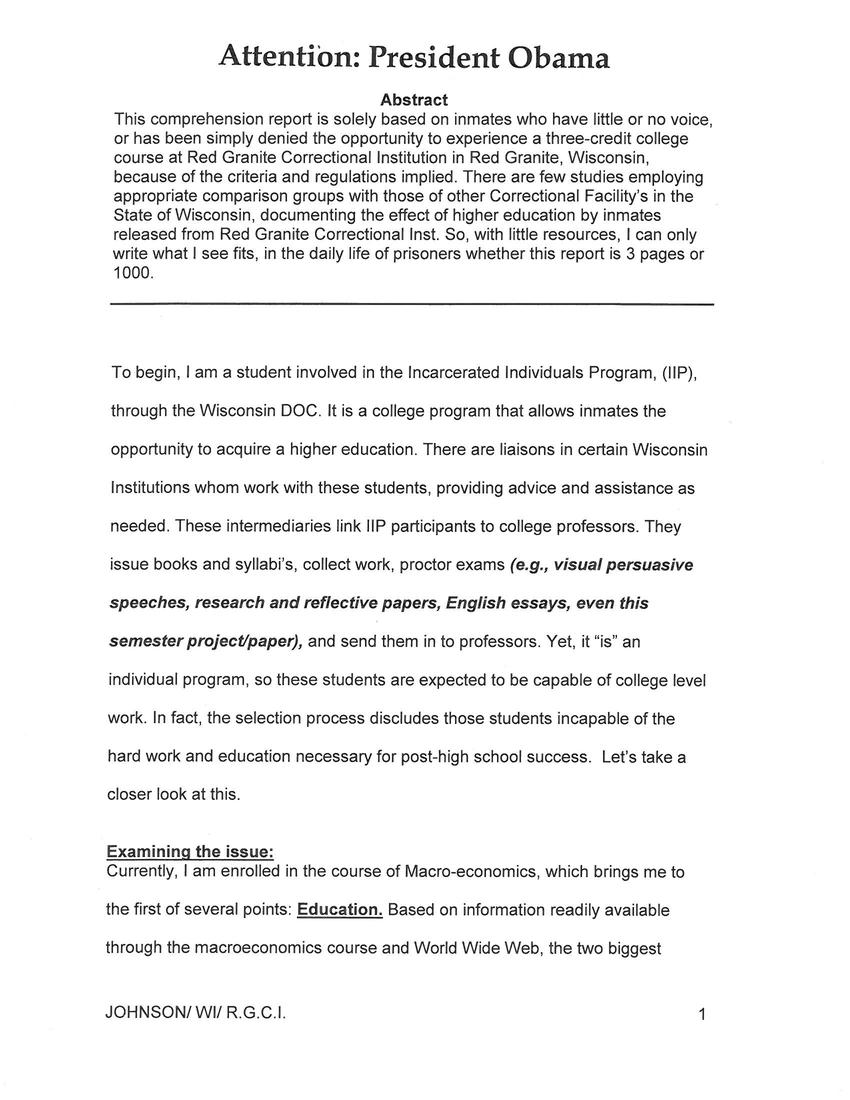
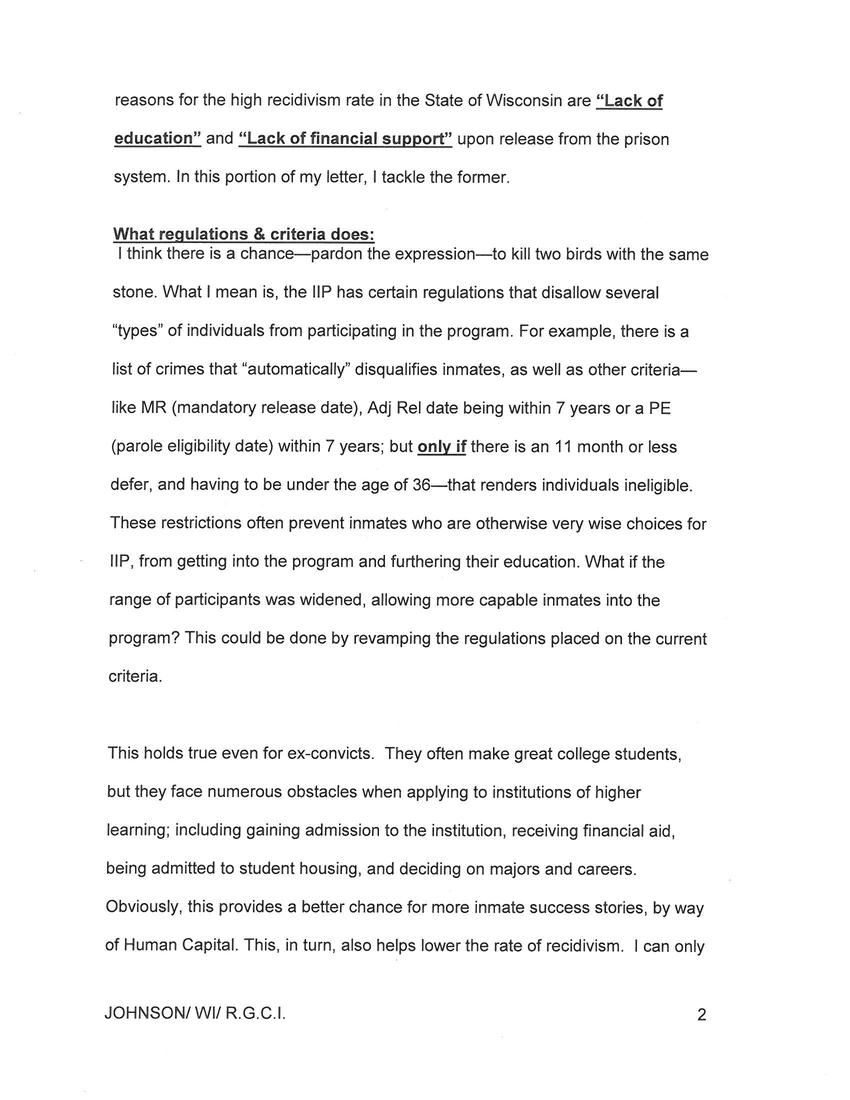
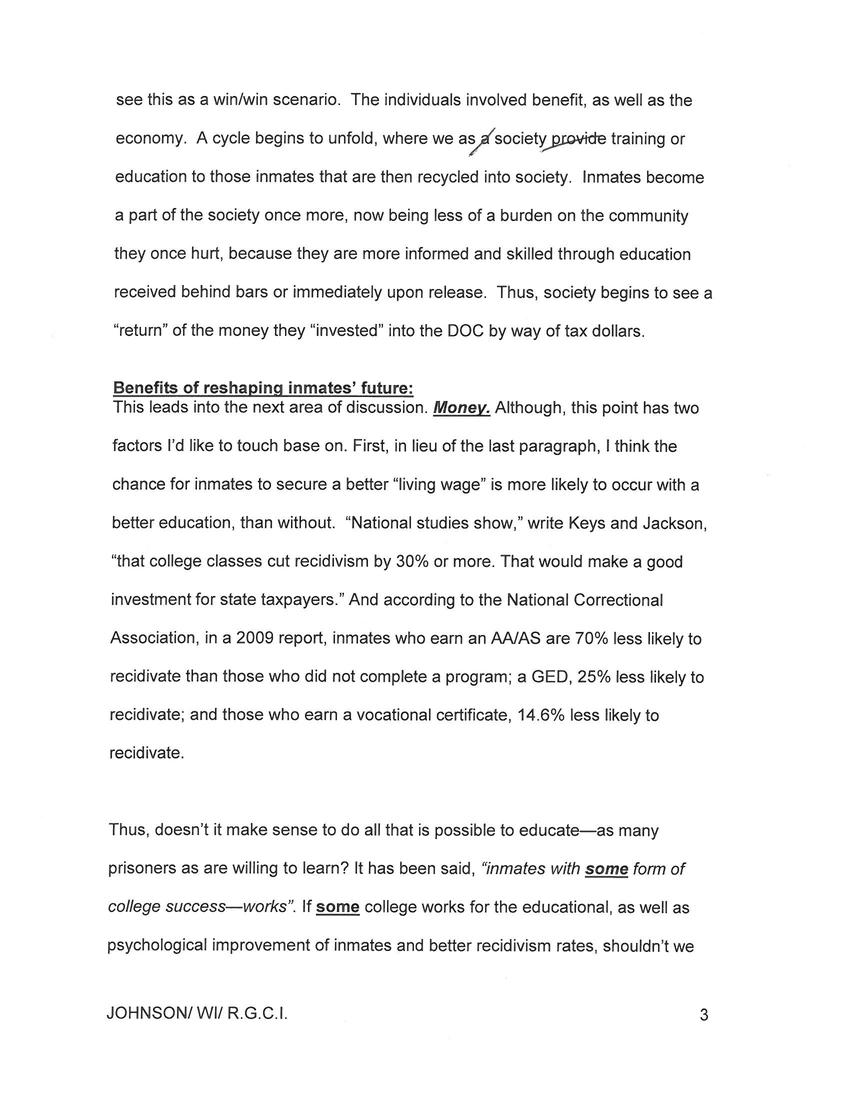
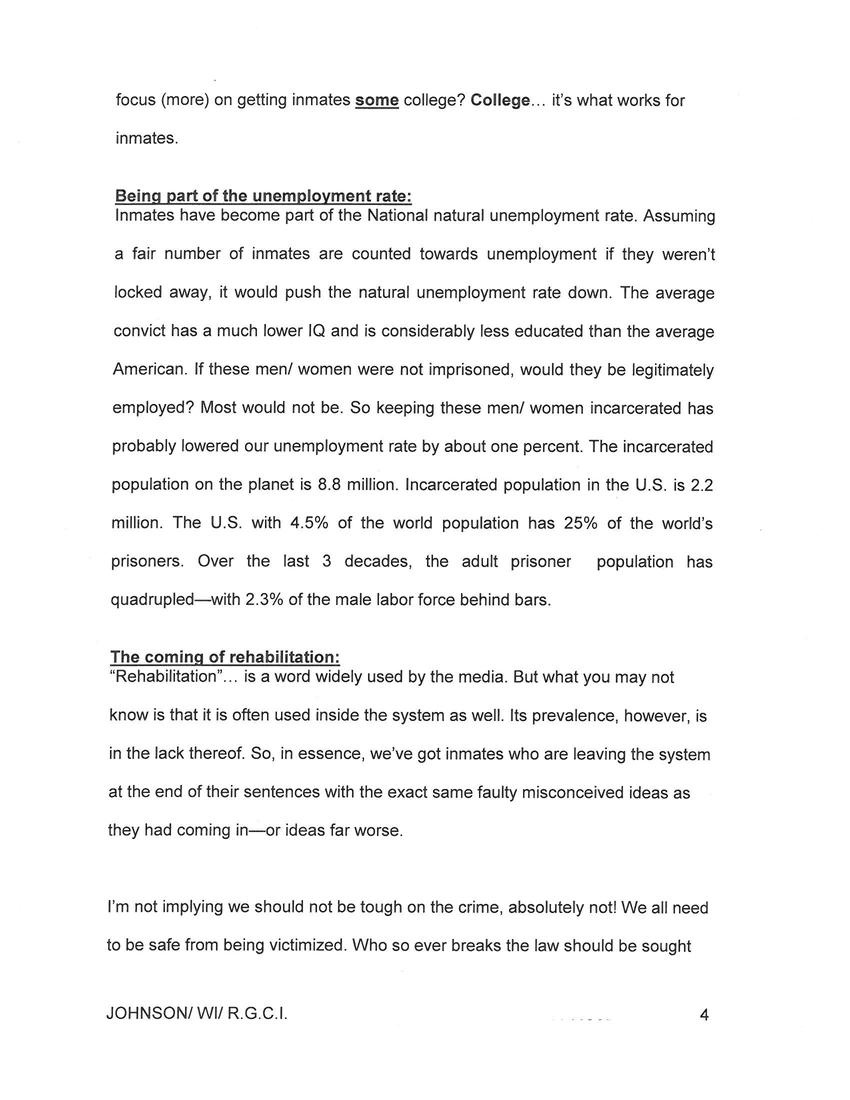
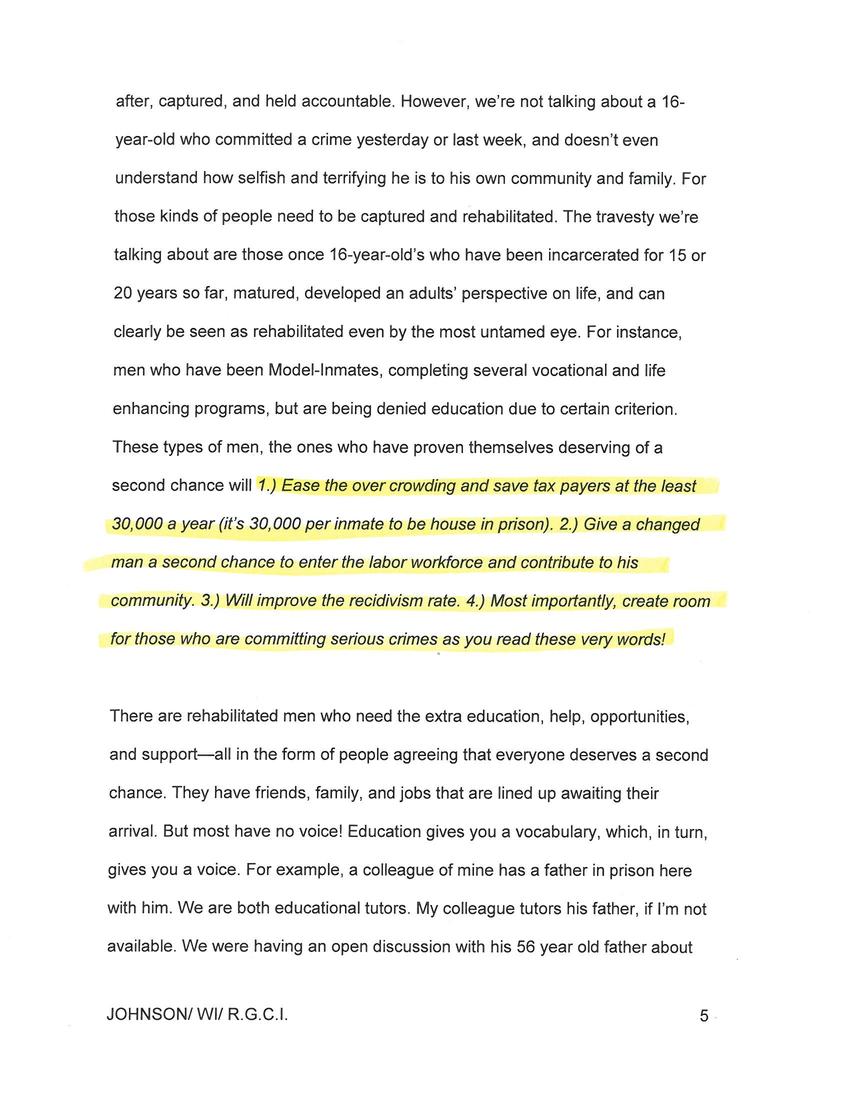
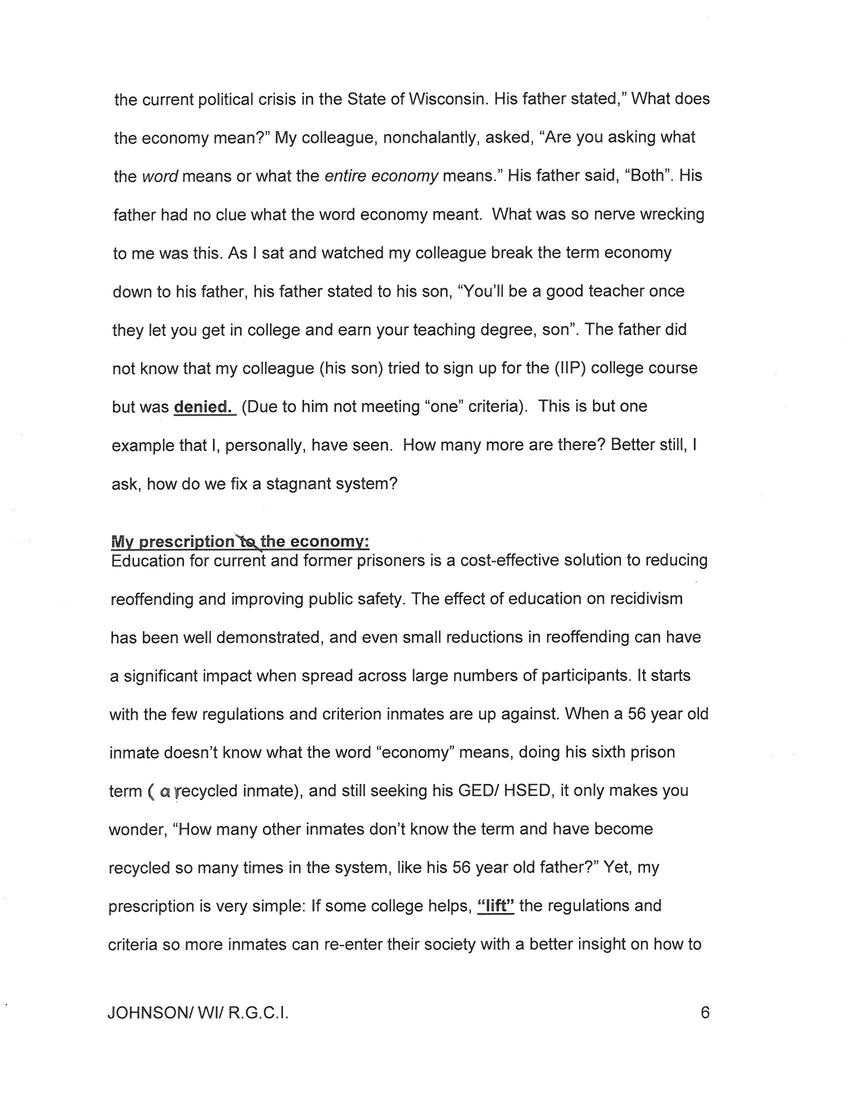

Replies